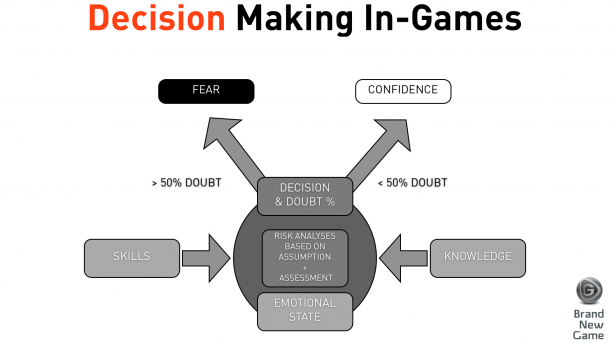Decision Making in Games
I am working on some models for my new book: Playing on the Job… any comments on this model about decision making in games (and potentially in life…?).
It describes how we make decisions in games. I expect we have three basic inputs: (1) Knowledge, (2) Skills which form (3) an Emotional state. Maybe ‘experience’ is another dimension? Or is that embedded in your ‘level of skills’ and ‘knowledge’…?
However… depending on your Skills and Knowledge you come to a decision with a reasonable doubt based on an assessment of the situation and assumptions… then you Decide to either DO or DO NOT (as Yoda says)…
SHARE THE MODEL AND SHARE YOUR THOUGHTS!

Please share your thoughts in a comment below or Tweet me @BartHufen #Gamification






Thursday May 9, 2013 at 12:01 pm
Ultimately we are talking about how decisions are made in the brain during game play. What is that process? It’s obvious to think about this as a cybernetic system, but I think there needs to be a definition in the different game states. Specifically of being ‘in the zone’ and out of it. The zone is when players do not even think but they of course are in a flow where all the brain systems seem to be in an epic sync. This is usually seen in professional gamers, or those who train a lot.
That training allows for the reactions times to become faster. Why and how? Well it seems when experiments were done showing pro chess players a board from the middle of a chess game for a second. They were then asked to recreate it. Without a problem they did it every time. However, when the pieces were just placed randomly on the board and then flashed, they couldn’t do it. They had not stregthened the neurons in the brain through training to recognize and assimilate those patterns. So through repetition/practice what you call the knowledge as a process has actually become a habit when we look at the mind. The habits are triggered by cues [position of chess pieces]. When a habit is formed that feedback loop routine is automatically activated because the neurons are so strong, its as if we ‘do it without thinking’.
Ok, so we have the neurons connecting all the pattern recognitions together through practice, and the adjoining routines that can follow, but what makes the real decision between which routine to run?
Researches have seen that we can predict the future about 3-5 seconds before our consciousness is realizing it. And they traced it back to the heart. The heart beat is sending more information to the brain, than the brain does to the heart, using the heart beat. When players are in the zone, the hearts are actually the ones giving that responsive edge of prediction to the environment around them. The emotional state of being ‘in the zone’ is that the information from the heart is being sent directly into the cerebellum [in charge of all non-conscious actions such as sneezing, couching, breathing, etc.] running the routines automatically before we are even conscious of what we are doing. There is no risk or decision or doubt happening when a gamer is ‘in the zone’. Out of the zone I think there is a model like you describe above. In the zone, we have no conscious risk calculations that are happening.
So essentially I think you have 2 models going. In the zone and out of the zone.
Thursday May 9, 2013 at 3:34 pm
Hi Bart,
Yes i’d say that experience is another dimension since this would be having put skills and knowledge into practice. However i have my doubts about the emotional state being formed by the former as it can also be influenced by external factors that we can not oversee such as sleep deprivation from to much gaming for example..;)
Thursday May 9, 2013 at 11:27 pm
Thanks for your input guys! I will look into it in more detail tomorrow!